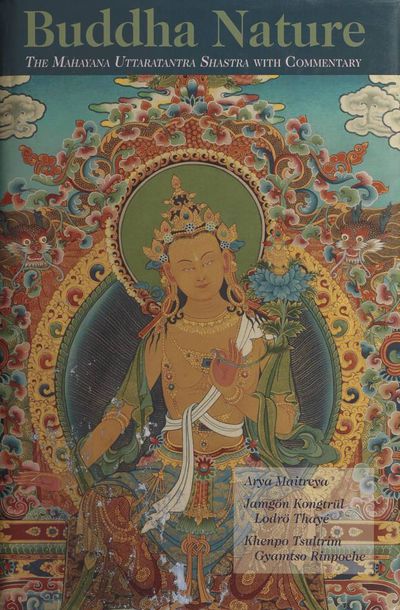Buddha Nature: The Mahayana Uttaratantra Shastra
< Books
((by SublimeText.Mediawiker)) |
|||
| (9 intermediate revisions by 5 users not shown) | |||
| Line 1: | Line 1: | ||
{{Book | {{Book | ||
| − | | | + | |BookPerson={{Book-person |
| + | |PersonPage=Maitreya | ||
| + | |PersonName=Maitreya | ||
| + | }}{{Book-person | ||
| + | |PersonPage=Asaṅga | ||
| + | |PersonName=Asaṅga | ||
| + | }}{{Book-person | ||
| + | |PersonPage='jam mgon kong sprul | ||
| + | |PersonName=Jamgön Kongtrul | ||
| + | }}{{Book-person | ||
| + | |PersonPage=Gyamtso, Khenpo Tsultrim | ||
| + | |PersonName=Khenpo Tsultrim Rinpoche Gyamtso | ||
| + | }}{{Book-person | ||
| + | |PersonPage=Fuchs, R. | ||
| + | |PersonName=Rosemarie Fuchs | ||
| + | }} | ||
|FullTextRead=No | |FullTextRead=No | ||
| − | |BookToc= | + | |TextTranslated=Texts/Ratnagotravibhāga Mahāyānottaratantraśāstra |
| − | * {{i|Foreword by Tenzin Dorjee|8}} | + | |BookToc=* {{i|Foreword by Tenzin Dorjee| 8}} |
| − | * {{i|Preface by Rosemarie Fuchs|10}} | + | * {{i|Preface by Rosemarie Fuchs| 10}} |
| − | * {{i|Introduction by Acharya Lodrö Namgyal|12}} | + | * {{i|Introduction by Acharya Lodrö Namgyal| 12}} |
| − | * {{i|Part | + | * {{i|'''Part One: Root Text'''| 17}} |
| − | * {{i|1. Tathagatagarbha|19}} | + | * {{i|1. Tathagatagarbha| 19}} |
| − | * {{i|Introduction|19}} | + | ** {{i|Introduction| 19}} |
| − | ** {{i|The First Three Vajra Points: The Three Jewels|20}} | + | ** {{i|The First Three Vajra Points: The Three Jewels| 20}} |
| − | *** {{i|Buddha|20}} | + | *** {{i|Buddha| 20}} |
| − | *** {{i|Dharma|20}} | + | *** {{i|Dharma| 20}} |
| − | *** {{i|Sangha|21}} | + | *** {{i|Sangha| 21}} |
| − | ** {{i|The Three Refuges|22}} | + | ** {{i|The Three Refuges| 22}} |
| − | ** {{i|The Last Four Vajra Points|22}} | + | ** {{i|The Last Four Vajra Points| 22}} |
| − | ** {{i|The Fourth Vajra Point: The Element|23}} | + | ** {{i|The Fourth Vajra Point: The Element| 23}} |
| − | * {{i|The Fifth Vajra Point: Enlightenment|43}} | + | * {{i|2. The Fifth Vajra Point: Enlightenment| 43}} |
| − | * {{i|The Sixth Vajra Point: Qualities|53}} | + | * {{i|3. The Sixth Vajra Point: Qualities| 53}} |
| − | * {{i|The Seventh Vajra Point: Activity|59}} | + | * {{i|4. The Seventh Vajra Point: Activity| 59}} |
| − | * {{i|Benefit|73}} | + | * {{i|5. Benefit| 73}} |
| − | * {{i|Part Two: Commentary, The Unassailable Lion’s Roar|79}} | + | * {{i|'''Part Two: Commentary, The Unassailable Lion’s Roar'''| 79}} |
| − | * {{i|Table of Contents|81}} | + | * {{i|Table of Contents| 81}} |
| − | * {{i|Tathagatagarbha|97}} | + | * {{i|1. Tathagatagarbha| 97}} |
| − | ** {{i|Introduction|97}} | + | ** {{i|Introduction| 97}} |
| − | ** {{i|The First Three Vajra Points: The Three Jewels|101}} | + | ** {{i|The First Three Vajra Points: The Three Jewels| 101}} |
| − | *** {{i|The First Vajra Point: Buddha|101}} | + | *** {{i|The First Vajra Point: Buddha| 101}} |
| − | *** {{i|The Second Vajra Point: Dharma|105}} | + | *** {{i|The Second Vajra Point: Dharma| 105}} |
| − | *** {{i|The Third Vajra Point: Sangha|108}} | + | *** {{i|The Third Vajra Point: Sangha| 108}} |
| − | ** {{i|The Three Refuges|112}} | + | ** {{i|The Three Refuges| 112}} |
| − | ** {{i|The Last Four Vajra Points|114}} | + | ** {{i|The Last Four Vajra Points| 114}} |
| − | ** {{i|The Fourth Vajra Point: The Element|117}} | + | ** {{i|The Fourth Vajra Point: The Element| 117}} |
| − | * {{i|The Fifth Vajra Point: Enlightenment|182}} | + | * {{i|2. The Fifth Vajra Point: Enlightenment| 182}} |
| − | * {{i|The Sixth Vajra Point: Qualities|218}} | + | * {{i|3. The Sixth Vajra Point: Qualities| 218}} |
| − | * {{i|The Seventh Vajra Point: Activity|238}} | + | * {{i|4. The Seventh Vajra Point: Activity| 238}} |
| − | * {{i|Benefit|283}} | + | * {{i|5. Benefit| 283}} |
| − | * {{i|Part Three: Explanations by Khenpo Tsultrim Gyamtso Rinpoche|299}} | + | * {{i|'''Part Three: Explanations by Khenpo Tsultrim Gyamtso Rinpoche'''| 299}} |
| − | * {{i|Part Four: Translator’s Notes|391}} | + | * {{i|'''Part Four: Translator’s Notes'''| 391}} |
| − | |AddRelatedTab=No | + | |AddRelatedTab=Yes |
| − | | | + | |QuotesTabContent={{GetBookQuotes}} |
| + | |PostStatus=Approved | ||
| + | |StopPersonRedirects=No | ||
| + | |BookParentPage=Library | ||
}} | }} | ||
Latest revision as of 18:34, 16 September 2020
All sentient beings, without exception, have buddha nature, the inherent purity and perfection of the mind, untouched by changing mental states. The Mahayana Uttaratantra Shastra, one of the "Five Treatises" said to have been dictated to Asanga by the Bodhisattva Maitreya, presents the Buddha's definitive teachings on how we should understand this ground of enlightenment and clarifies the nature and qualities of buddhahood. This seminal text details with great clarity the view which forms the basis for Vajrayana, and especially Mahamudra, practice. Thus it builds a bridge between the Sutrayana and the Vajrayana levels of the Buddha's teaching, elaborated here in Jamgön Kongtrül's commentary. (Source: Shambhala Publications)
| Citation | Fuchs, Rosemarie, trans. Buddha Nature: The Mahayana Uttaratantra Shastra. By Arya Maitreya. Written down by Arya Asanga. With a commentary by Jamgön Kongtrül Lodrö Thayé ('jam mgon kong sprul blo gros mtha' yas) "The Unassailable Lion's Roar," and explanations by Khenpo Tsultrim Gyamsto Rinpoche. Ithaca, NY: Snow Lion Publications, 2000. |
|---|---|


